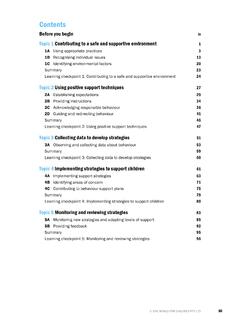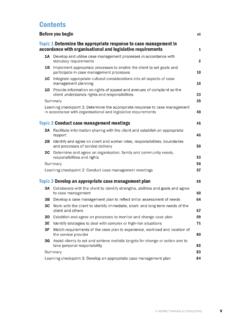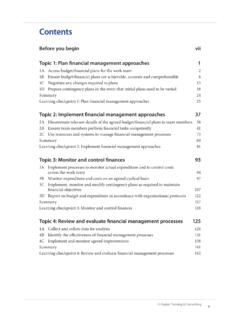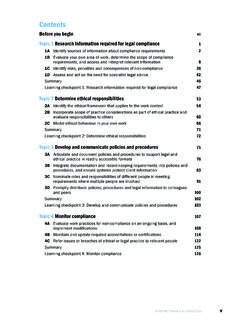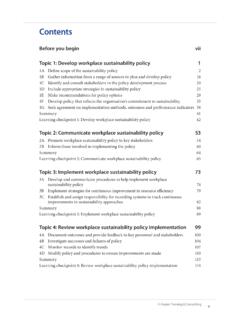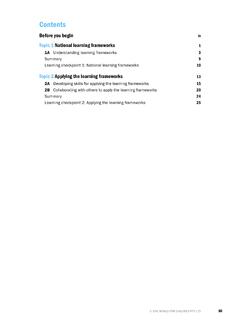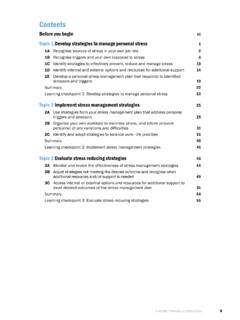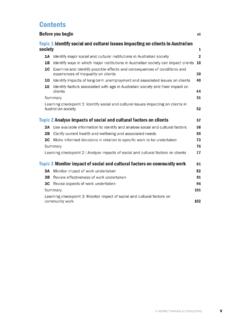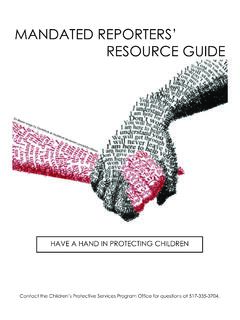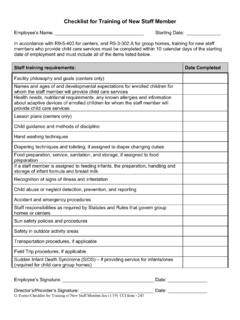Transcription of CHCLEG001 Work legally and ethically - Amazon Web Services
1 ASPIRE TRAINING & CONSULTING vContentsBefore you begin viiTopic 1 Identify and respond to legal requirements 11A Identify, access and interpret sources of work role legal requirements 21B Identify the scope and nature of own legal responsibilities 201C Adhere to work practice legal requirements , policies, procedures and scope of role 241D Recognise and report potential or actual breaches according to organisation procedures 36 Summary 39 Learning checkpoint 1: Identify and respond to legal requirements 40 Topic 2 Identify and meet ethical responsibilities 452A Identify, access and interpret information about ethical responsibilities 462B Identify the scope and nature of own ethical responsibilities 512C Meet ethical responsibilities according to workplace policies and protocols 532D Recognise and discuss potential ethical issues and dilemmas 562E Recognise own values and attitudes and ensure non-judgmental practice 592F Use problem-solving techniques when exposed to competing value systems 612G Recognise and report unethical conduct 632H Recognise potential and actual conflicts of interest and take action 66 Summary 68 Learning checkpoint 2.
2 Identify and meet ethical responsibilities 69 Topic 3 Contribute to workplace improvements 733A Identify and improve work practices to meet legal and ethical responsibilities 743B Proactively share feedback with colleagues and supervisors 783C Identify and contribute to review and development of policies and protocols 81 Summary 83 Learning checkpoint 3: Contribute to workplace improvements 84 ASPIRE TRAINING & CONSULTING 1 Topic 1In this topic you will learn how to:1A Identify, access and interpret sources of work role legal requirements 1B Identify the scope and nature of own legal responsibilities1C Adhere to work practice legal requirements , policies, procedures within scope of role1D Recognise and report potential or actual breaches according to organisational proceduresIdentify and respond to legal requirementsThe community trusts and expects service providers to uphold and apply proper standards.
3 As a community worker you have a great deal of responsibility. You must always act in a professional, competent and ethical manner and you need to be familiar with laws, rules, standards and regulations relevant to the community Services industry. These protect the rights of both individuals and workers. They also ensure high-quality and safe Services are provided. 6 CHCLEG001 WORK legally AND ETHICALLYS hare information When supporting a person it may be necessary to work with a range of other agencies. A person (or their representative) must give consent before any information is shared with or accessed from another agency. Most community organisations gather this consent using a specific form. Consent is given for access to particular information for a particular purpose. You must not pass on information without the person s consent.
4 People receiving Services have a right to know what you record about them and to see their own records. A person s record is highly confidential and you may be required to sign a confidentiality agreement when you are first employed, saying you will not without consent divulge any information you have acquired during or after your involvement with people you provide Services to unless legally required to do information that is shared between agencies may include:XXinformation to enable referralsXXincident reportsXXsupport plans and goalsXXinformation about individual of confidential informationThere are some instances in which you are permitted to disclose information as part of your duties. For example, if the person is being referred on for medical treatment, the hospital, specialist or doctor needs to know the person s history, allergies and personal details.
5 You must always obtain the person s informed consent before you disclose confidential information to a third party. There are some situations where you may be required to disclose confidential information. Here are some examples of such to disclose private or confidential informationXXIf compelled by law; for example, if the person has a reportable disease or the information is requested by a court of law XXIf a person s interests require disclosure and there is a serious risk which justifies breaching confidentiality; for example, risk of suicide, self-harm or harm to others XXIf there is a duty to the public; for example, there is public threat or concernXXIf the person has consented to the disclosureConsequences of breaching confidentialityBreaching confidentiality may have serious consequences for the person you are providing Services to, for you as a support worker, for your employing agency and for your profession.
6 It may have serious effects on the working relationship between you and the person receiving support. Trust, which is essential for a good working relationship, may be damaged or broken beyond repair. This may leave the person with an inability to trust other workers, thus limiting their options and opportunities for receiving the Services they need. ASPIRE TRAINING & CONSULTING8 CHCLEG001 WORK legally AND ETHICALLYM andatory reporting of child protection issuesSome states include mandatory reporting of child abuse and neglect in their child protection legislation. In the legal context, mandatory means required by and enforced by legislation. Mandatory reporting means that some people in some occupations are required by law to report child abuse and neglect to government authorities. Not all states have legislation requiring mandatory reporting , and not all occupations are covered by mandatory reporting laws.
7 Check the child protection legislation in your own state and check your employer s policies on child protection to find out if you are covered by mandatory reporting . If you are not sure about this, consult your supervisor. Depending on your work role and the structure of your organisation, it may be you or your supervisor or a manager or other professional who is responsible for reporting concerns to the relevant state government department. You may often be in the best position to observe and collect first-hand information, so it is essential that you record your concerns accurately and objectively. If the situation is taken to the children s court, your records and notes may be required in evidence. Reports need to be accurate and objective. Consequences of breaching child protection ActsIn all states a government department is responsible for applying child protection legislation.
8 If child protection Acts are breached, officers of that department are responsible for investigating and acting on concerns about the welfare of a child . This may result in entering and searching premises, carrying out an investigation, and taking actions such as removing a child from immediate danger. The matter may then be referred to a children s court for a decision about what further actions should be taken to protect and ensure the safety of the child . Adults who are proven to have harmed a child may be charged with various criminal offences. In relation to child protection, common law duty of care means that if you are working in a role where you owe a duty of care to a child and you breach that duty of care by acting in a way that causes the child foreseeable harm, you may be deemed negligent. The existence of a duty of care relationship depends on the facts of each particular case; however, in general an adult is assumed to have a duty of care towards a child in their care.
9 Discrimination To discriminate is to treat someone unfairly or favour others. This may occur when there is a mix of cultures and when people don t understand cultural differences. Discrimination is never acceptable behaviour and is against the must promote equality of opportunity for everyone. It is unlawful to discriminate against people on the basis of age, gender, ethnicity, disability or impairment, marital status, sexual preference, political or religious beliefs. ASPIRE TRAINING & CONSULTING12 ASPIRE TRAINING & CONSULTINGCHCLEG001 WORK legally AND ETHICALLYC haracteristics of negligence and harm are outlined Negligence exists where: XXa duty of care relationship exists in law; that is, where one person owes a duty of care to another personXXthe duty of care has been breached because reasonable care was not taken to prevent harm or injuryXXactual harm has been suffered as a result; the harm must have been reasonably Harm may be: XXphysicalXXemotional and and duty of care While aspects of WHS legislation may vary between states and territories, there are common obligations under the duty-of-care principle.
10 Everyone in the community service environment has a responsibility to take reasonable care for themselves, the people receiving Services , visitors and each other. Your workplace will have a specific duty of care policy that you must use to guide your practice, your duty of care under WHS is met by ensuring that you contribute to providing a safe, healthy and supportive environment, where everyone s rights are upheld and supported. This includes reporting WHS hazards and risks, ensuring access for all people and supporting the wellbeing of all the people that you provide Services to. You can read an example duty of care policy at the following site: u can find information about duty of care as it relates to disability Services workers at: (This is specific to a disability service context but most of the principles and the excellent discussion are relevant to any sector of community work.)
